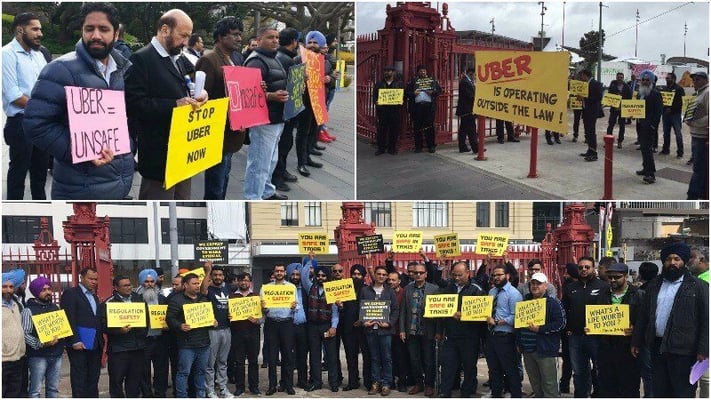Auckland taxi drivers protest Uber’s operation

Around 100 taxi drivers gathered on Queens Wharf in Auckland on September 5, asking the government to take an action against unregulated Uber drivers in the city.
It was part of the nationwide protests undertaken by taxi drivers against the US multinational company that runs a popular ride-sharing business and is a sought-after substitute for conventional taxi service.
Protest organiser Harpreet Bhullar, told Indian Weekender that taxis in New Zealand were operating under strict passenger service licence laws, which included in-car cameras for safety of passenger and driver, criminal and medical check-ups through police, and mandatory requirement of carrying a P (passenger) endorsement ID.
“Uber is not following these laws by excusing themselves as a share ride instead of taxi service,” Bhullar said.
Similar protests were held in Christchurch (read our report on page 8) and Wellington.
Bhullar said that Uber drivers must fulfil their GST and tax obligations.
Currently, the company retains 25 per cent of the total fare and the remaining is transferred to the driver’s account, which may or may not be taxable.
However, taxi fares are inclusive of GST, which the drivers collect and pay at the end of the year.
There is no such provision in Uber, and if there is one, it’s not transparent enough for the government to know. Also, on a regular day, a ride from point A to B could cost $10 and on a busy day, the same could cost up to $50. The same does not apply for taxi drivers.
Safety of the passengers is also a matter of concern, as for most Uber drivers, it is a second job. Under NZTA laws, drivers cannot work continuously beyond a certain number of hours without taking a break. As there is no system in place where the number of hours of Uber drivers can be monitored, it puts customer safety into jeopardy.
In March this year, when Uber extended its operations in New Zealand to include Christchurch, they informed their drivers that they could do away with the P endorsement and start working by merely passing the company’s security screening process. The following month, the policy was rolled out in Auckland and Wellington.
Transport Minister Simon Bridges said last month that Uber’s change in policy was illegal and that it could potentially face a ban. Bhullar says that in spite of the government’s regular reassurances, nothing has been done yet.
He said taxi drivers were not seeking a ban on Uber. “We welcome new technology. All we want is an equal playing field.”
Around 100 taxi drivers gathered on Queens Wharf in Auckland on September 5, asking the government to take an action against unregulated Uber drivers in the city.
It was part of the nationwide protests undertaken by taxi drivers against the US multinational company that runs a popular ride-sharing...
Around 100 taxi drivers gathered on Queens Wharf in Auckland on September 5, asking the government to take an action against unregulated Uber drivers in the city.
It was part of the nationwide protests undertaken by taxi drivers against the US multinational company that runs a popular ride-sharing business and is a sought-after substitute for conventional taxi service.
Protest organiser Harpreet Bhullar, told Indian Weekender that taxis in New Zealand were operating under strict passenger service licence laws, which included in-car cameras for safety of passenger and driver, criminal and medical check-ups through police, and mandatory requirement of carrying a P (passenger) endorsement ID.
“Uber is not following these laws by excusing themselves as a share ride instead of taxi service,” Bhullar said.
Similar protests were held in Christchurch (read our report on page 8) and Wellington.
Bhullar said that Uber drivers must fulfil their GST and tax obligations.
Currently, the company retains 25 per cent of the total fare and the remaining is transferred to the driver’s account, which may or may not be taxable.
However, taxi fares are inclusive of GST, which the drivers collect and pay at the end of the year.
There is no such provision in Uber, and if there is one, it’s not transparent enough for the government to know. Also, on a regular day, a ride from point A to B could cost $10 and on a busy day, the same could cost up to $50. The same does not apply for taxi drivers.
Safety of the passengers is also a matter of concern, as for most Uber drivers, it is a second job. Under NZTA laws, drivers cannot work continuously beyond a certain number of hours without taking a break. As there is no system in place where the number of hours of Uber drivers can be monitored, it puts customer safety into jeopardy.
In March this year, when Uber extended its operations in New Zealand to include Christchurch, they informed their drivers that they could do away with the P endorsement and start working by merely passing the company’s security screening process. The following month, the policy was rolled out in Auckland and Wellington.
Transport Minister Simon Bridges said last month that Uber’s change in policy was illegal and that it could potentially face a ban. Bhullar says that in spite of the government’s regular reassurances, nothing has been done yet.
He said taxi drivers were not seeking a ban on Uber. “We welcome new technology. All we want is an equal playing field.”









Leave a Comment